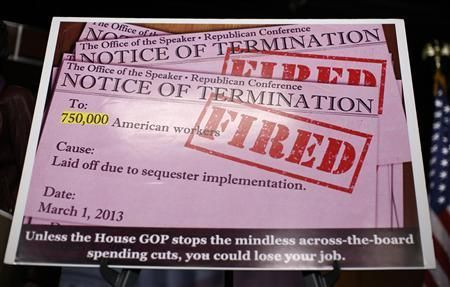Sequester Is Upon Us: Defending Contractor Rights Against Government
Opinion

The quiet advent of sequester on March 1 has proved once again that the business community has learned to anticipate and adapt to what has been considered irrational political shenanigans.
Few in the business and finance sectors have shown much anxiety over the ultimate effect of the sequester’s modest reduction in the growth of government spending. Although large government contractors are likely able to be better prepared to weather the sequestration through economies of scale among multiple billion dollar contracts -- and maybe take advantage of the situation by acquiring other struggling competitors -- many small business concerns incorrectly believe they will be protected by the large prime contractor “firewall.”
Even industries most dependent upon federal spending, like the defense and healthcare sectors, realize that sequester does not mean “stop.” Government contracts and federal procurement laws provide effective methods for mitigating termination-related losses and recovering costs, often including reasonably anticipated lost profits.
Even Government Contracts Protect Private Contractors
Contract termination “for the convenience of the government” does not end the government’s obligations to private contractors (or lower tier subcontractors). Contractors have effective contractual remedies to avoid or substantially mitigate losses associated with termination.
Private contractors’ administrators should resist any government attempt to “modify” a current contract unless the terms of the modification are as advantageous, under the current circumstances, as the original agreement and contain effective remedies for government breaches or termination actions. Subcontractors should not unnecessarily settle their claims against the prime contractor.
All contractors, at every tier, need to be watchful of “release” language in contract modifications and other correspondence until the claim has actually been analyzed and not rushed during the emotion of sequestration. Contractors should rarely eliminate their economies of scale through reductions in deliverables and, effectively, take a loss on a contract. Just say “no.”
When initially entering a government contract, the government likely inserted onerous socio-economic requirements unrelated to the scope of work. Government contractors must analyze these socio-economic requirements to ensure there are no lingering programs, reporting responsibilities, or other required notices. In many instances, there may be the possibility of compensation for complying with socio-economic programs.
Prepare Now For Whatever Cost-Saving Tactic The Government Adopts
The government always has a variety of options for strong-arming private contractors.
The threat of government termination is often more bark than bite. If faced with a termination notice, contractors should first assess the value of the contract. In some instances, termination can relieve contractors of bad deals while still entitling them termination-related compensation. Thus, sequestration may be a “win, win” for all involved, especially in a fixed-price losing contract.
Businesses at every tier must move quickly to assemble a comprehensive contract file. Gather all relevant records, correspondence, emails and other communications pertaining to each government contract. Do not rely on “personal relationships” within the agency to protect the company, or believe that your businesses deliverables are “essential” and sequestration will only happen to your competitors or other industries.
Memorialize conversations with contracting officers or contracting officer technical representatives. After a conference call, send an e-mail to the governmental agency confirming what was discussed. Although perhaps distasteful, be prepared to move quickly into dispute proceedings with a strong record. If you need to explain to the contracting officer that the business needs to protect its interests in these uncertain times, do not be shy in stating exactly why you are documenting conversations.
This file will also provide support in the event of a government audit or “false claim” inquiries that may be used to coerce inequitable modifications or significantly slow the payment process. Be prepared for a governmental audit that can, unfortunately, take years to complete. Companies should know how to collect at least partial payment while this process is undertaken.
Sequester Won’t Last Forever
Government contract officers and, at least, large government contractors, have anticipated sequester for months, providing lots of time to review current contracts and identify opportunities to terminate or “do over” disadvantageous contracts -- or get rid of troublesome contractors.
Private contractors should anticipate actions premised on the all-too-familiar political axiom, “never miss opportunities presented by a good crisis.” Even if a compromise is reached, and the effects of sequester are minimized from a policy perspective, the governmental agency plans are already prepared and, in many cases, going into effect.
As anyone who has worked in the government knows, once a plan is initiated, it is not very easy to stop the process. Contractors should be on guard against government attempts to leverage sequestration and whatever future spending cuts may emerge from the political process. Be prepared to “play out the clock” and take a strong stand under contractual and statutory dispute resolution procedures.
Knowing your contractual rights, perfecting contract files, designating an effective administrator to manage the process, and having experienced government procurement consultants and attorneys will largely even the playing field in the complex and fast-moving, post-sequester environment.
Brett W. Johnson is a partner in the Phoenix office of Snell & Wilmer, a business law firm. He is a government relations attorney who regularly advises and represents businesses throughout the U.S. in negotiating, drafting, enforcing and complying with government contracts, subcontracts and compliance programs. He can be reached at 602.382.6312 or at bwjohnson@swlaw.com.
© Copyright IBTimes 2024. All rights reserved.





















